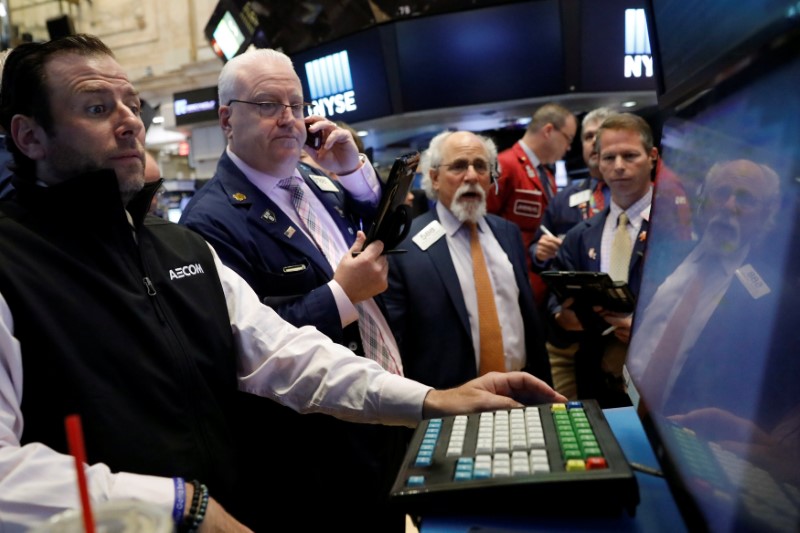By Sinead Carew
NEW YORK (Reuters) - The S&P 500 and Dow stock indexes were weighed down by falling energy shares as oil prices fell on Wednesday and added to investor concerns about low inflation, while healthcare and technology stocks helped lift the Nasdaq Composite index.
Energy (SPNY) was the weakest S&P sector with a 1.6 percent decline after oil prices (LCOc1) reversed course during the morning session and U.S. crude (CLc1) touched its lowest point since August despite larger-than-expected declines in inventories.
Continued weakness in oil futures added to investor worries about inflation and as a result hurt cyclicals such as banks and industrials, according to Chris Zaccarelli, Chief Investment Officer at Cornerstone Financial Partners in Huntersville, North Carolina.
"Because people are seeing oil lower as another harbinger of lower inflation, a lot of other cyclicals (besides energy stocks) aren't doing well," said Zaccarelli.
Bank stocks <.SPXBK> fell 0.8 percent as investors worried interest rate margins would be hurt by a flattening yield curve, which is also driven by inflation expectations.
Industrial stocks (SPLRCI) were also among the biggest decliners with a 0.7 percent drop. Caterpillar's (N:CAT) 3.3 percent fall weighed on the sector while a 1.6 percent rise in FedEx (N:FDX) was its biggest boost.
Investors looking for growth opportunities turned to Nasdaq, which contains many technology and biotechnology companies, according to Zaccarelli.
Healthcare stocks were helped by reports that U.S. President Donald Trump's efforts to rein in drug prices may be friendlier than expected to the industry, according to Brad McMillan, Chief Investment Officer for Commonwealth Financial in Waltham, Mass.
In general equity investors are biding their time ahead of quarterly results, which are expected to be good.
"We're just continuing to bounce around here until second quarter earnings come out," said McMillan.
The Dow Jones Industrial Average (DJI) fell 57.11 points, or 0.27 percent, to close at 21,410.03, the S&P 500 (SPX) lost 1.42 points, or 0.06 percent, dropping to 2,435.61 and the Nasdaq Composite (IXIC) added 45.92 points, or 0.74 percent, rising to 6,233.95.
The energy index has fallen 14.9 percent so far this year compared with an 8.9 percent rise for the S&P 500. Oil futures have fallen about 21 percent so far this year.
The four-company telecommunications sector (SPLRCL) was the second weakest with a 1.2 percent drop, with AT&T Inc (N:T) leading the percentage declines.
The Nasdaq biotechnology index (NBI) was up 4.1 percent, on track for its biggest one-day gain since the day after Trump's Nov. 8 election. Its biggest boosts were Celgene (O:CELG), and Regeneron (O:REGN) which both rose more than 5 percent and Biogen (O:BIIB), which rose 4.7 percent.
Republicans were due to release details of a bill aimed at overhauling U.S. healthcare law on Thursday and a vote could come as soon as next week, several senators told Reuters. Republicans worked behind closed doors for weeks on the bill. If it passes, some investors see it as a positive sign for Trump's pro-business agenda
Declining issues outnumbered advancing ones on the NYSE by a 1.70-to-1 ratio; on Nasdaq, a 1.04-to-1 ratio favored decliners.
About 7.16 billion shares changed hands on U.S. exchanges compared with a 6.92 billion average for the last 20 sessions.
